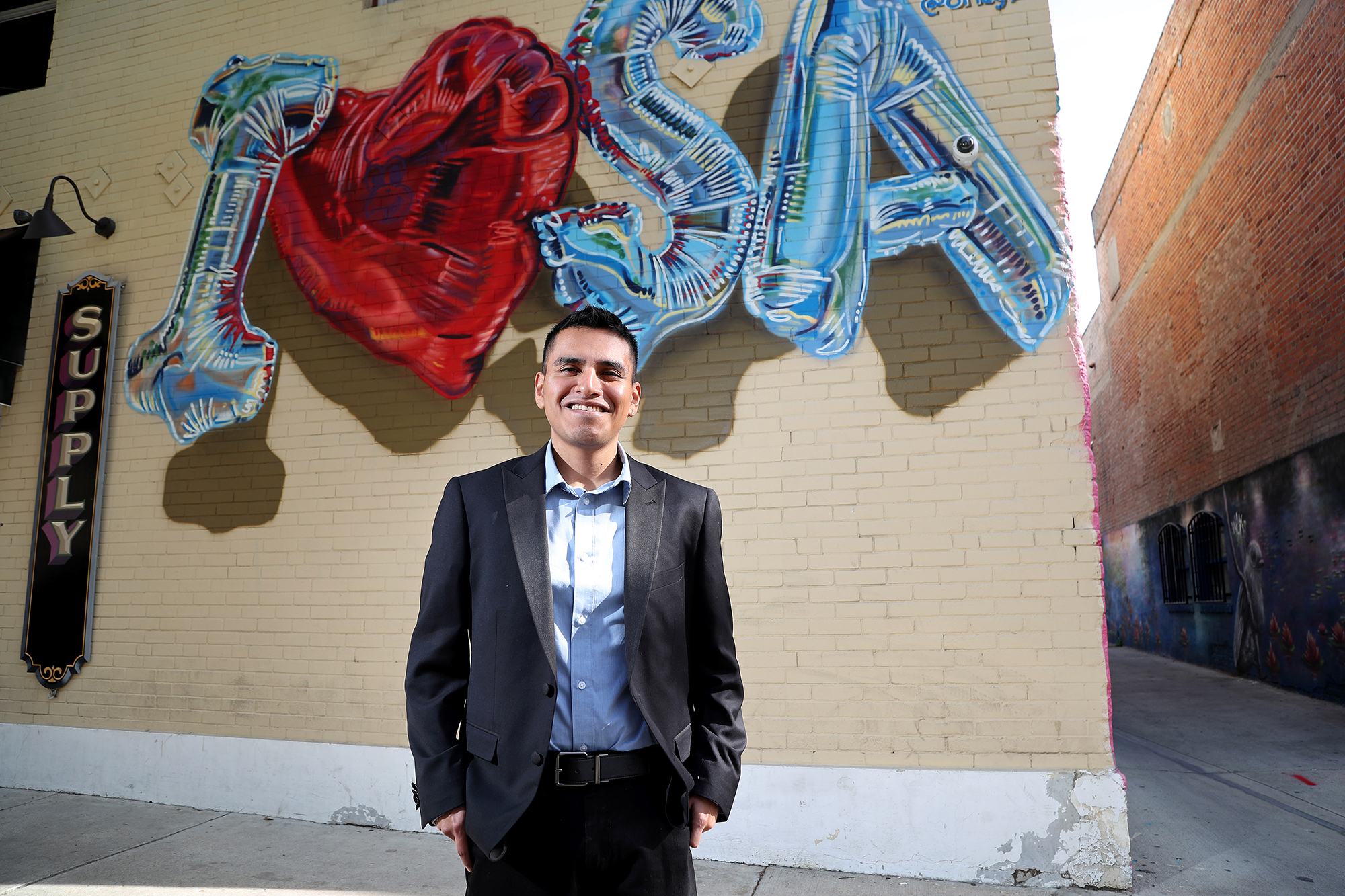A failed recall effort ushers in a new era for Latino politics in Orange County
California politics, homepage news
Gustavo ArellanoNovember 21, 2023
On a typical evening, Chatos Bar and Grill in downtown Santa Ana serves up fine Mexican food and cocktails to a half-empty dining room. On November 14, the line was outside, but tacos and tequila were the last thing on everyone’s minds.
Supporters of Santa Ana Mayor Pro Tem Jessie Lopez were ready to party. For months they had been knocking on doors in Lopez’s neighborhood, in the northern, wealthier part of the city, fighting a recall.
Critics, fueled by nearly $800,000 from real estate groups and the city’s powerful police union, painted Lopez as an outrageous radical for voting for rent control and oversight of a civilian police commission. Lopez, 34, who is in her first term, was one of four unabashed progressives on the council and was seen as the easiest to eliminate.
Despite being outscored 8–1, Lopez defeated the recall by a decisive 56% to 43%. That’s why election night in Chatos was as joyful as any gathering I’ve seen discussing Santa Ana politics, almost as long as many of Lopez’s young volunteers have lived.
Supporters were mainly Latino, but also white, black and Vietnamese. Students mixed with seniors. Artists stood alongside small business owners. Lifelong friends of Lopez embraced voters who voted against her in 2020, but were won over by council members’ attention to meat-and-potatoes issues like broken streetlights and traffic. Even police officers showed up to pay their respects.
Dazzling speaker after dazzling speaker took turns on a stage where a DJ would normally play songs.
They tried to trample on our rights, Orange County Supervisor and former Santa Ana Mayor Vicente Sarmiento told the roaring crowd. Now we say: you cannot buy these elections. You can’t buy us off. Santa Ana is not for sale and pronounces the city SanTana as the locals do.
Los Angeles members of the Working Families Party, of which Lopez is a member, drove down. So did Cudahy Councilwoman Elizabeth Alcantar, who met Lopez while the two were visiting Long Beach State. Everyone knew history had been made that night, even if they didn’t understand the full extent of what had happened.
Recall advocates, including Mayor Valerie Amezcua and Councilman Phil Bacerra, have yet to speak publicly about the results. They should regret the choice to let hundreds of thousands of dollars’ worth of negative mailers make their anti-Lopez argument for them, instead of doing the legwork as the winning side did.
I haven’t written about the recall until now because my wife has been catering for the city for the past year. But I’ve been watching it closely because it’s a bellwether for Latino politics in Orange County.
Twenty years ago, Lopez, another progressive elected official from Santa Ana, faced a well-funded recall effort. That was the late Nativo Lopez, a pioneering Chicano activist and administrator of the Santa Ana Unified School District, who helped spark Orange County’s purple political transformation in the mid-1990s by registering tens of thousands of Latinos to vote. He wanted to establish a political dynasty, but his arrogant behavior, cronyism and…
raza
His first mentality made him an abomination to the city’s ruling class. A recall election against him in 2003 passed with 70% of the vote, and he never held office again.
His crushing defeat largely deterred progressive-oriented Latinos from running for office in Orange County for a generation. In Santa Ana, activists chose political windmills, while moderate council members (nearly all Latino Democrats) passed policies that gave away city property to developers, encouraged gentrification, and handed out fat pay raises to police, whose union then spent millions of dollars to protect their favored businesses. to help. candidates stay in power or eliminate those they didn’t like.
Those days seemed like history from long ago during Lopez’s celebration.

Since taking office in 2020, the Santa Ana City Council has passed the aforementioned rent control ordinance (the only one of its kind in Orange County) and established a permanent fund to help residents fight deportation. Last month, the council put a measure on the 2024 ballot that would give non-residents the right to vote in municipal elections, which would be a first in California if passed.
At the end of the evening, I pulled Jessie aside and told her, “You may not realize it tonight, but you are part of a very long journey,” Sarmiento told me a few days later. “People lost seats and races and paved the way for you for this moment. You stood on the shoulders of a group of people who gave up a lot.’
The energy of that room had such an incredible impact, and I hope it continues, Lopez said in a phone interview before leaving for a well-deserved break. What I saw that night I am sure I will never forget.
Santa Ana’s progressive swing is part of a trend in Southern California that pits young Latinos against their liberal elders, as Los Angeles City Councilman Euniss Hernandez upset then-incumbent Gil Cedillo last year. Hernandez connected Lopez with volunteers and donors, a fact that caused Lopez’s opponents to send out attack mailers claiming that L.A.
wokosos
infiltrated Orange County.
In fact, homegrown activists have been planning a takeover of Santa Ana politics for years. These are people I have known seemingly forever, people who have long prided themselves on not being involved in the
sale
world of politics, but fell into it out of frustration.

For example, Lopez became involved in the battle over the Wilowick Golf Course, a 102-acre green space in Santa Ana but owned by the city of Garden Grove. Santa Ana officials have long wanted to develop the land, but people living near Willowick organized to ensure they would have a say.
We presented the Garden Grove and Santa Ana city councils [resident] surveys around 2019, the council member said. They rejected that information. They didn’t want to meet us. They didn’t even respond to our emails.
Soon after, Lopez volunteered for the Santa Ana Unified trustee campaign of Carolyn Torres, whom I first met in early 2010 when she was fighting gang injunctions in Santa Ana as a member of the group Chicanos Unidos.
Politicians always told us, ‘You can be an activist, but you can’t get into electoral politics,'” said Torres, who now chairs a progressive majority board. But when I started to see that we kept hitting this wall trying to convince decision makers of our causes, even allies who didn’t want to go out on a limb, I knew we had to run.”
Chispa, a nonprofit led by 31-year-old Hairo Cortes, supported Lopez and Torres. I first saw him in action when he was arrested as a student for protesting deportations. He was also skeptical about politics until 2016, when police union-backed council candidates outdid two activist friends.
It was our aha moment,” he said. His voice could still be heard at Lopez’s election party. ‘We thought: we have to invest in an electoral strategy. We don’t know what the f means, but we learn from it.
Chispa, which can endorse political candidates and issues as a 501(c)(4) registered nonprofit, joined with other groups to map out a playbook. They made sure it didn’t just become a Latino issue, Cortes said, because “we can’t win at the expense of other communities. That’s not winning.”
Another part of their strategy was for Chispa policy director Bulmaro “Boomer” Vicente to run for the assembly in 2022. He received only 15% of the vote in the primaries and failed to make it to the general election.
But
“Losing taught him a lot of things” about keeping Lopez in power, Cortes said. “How to organize races on a larger scale, and sophistication that we were not used to. Why wouldn’t a municipal candidate do it that way?
Foo’
I learned how to raise money!”
Cortes, Vicente and others partied late into the night and continued until the early morning. The plan for 2024 is for Lopez and Torres to run for re-election, while their supporters volunteer in their races and others to maintain a progressive majority on the city council and school board. The hope is that this new template for victory can spread from Santa Ana, the historic stronghold of Latino politics in Orange County.
Jessie winning is huge, Torres said. The whole of these leftists coming in here is something that is not going to be profound. That’s done. Campaign season after campaign season, it is clear what the community wants.
Fernando Dowling is an author and political journalist who writes for 24 News Globe. He has a deep understanding of the political landscape and a passion for analyzing the latest political trends and news.



